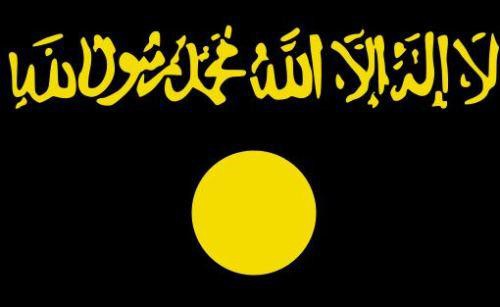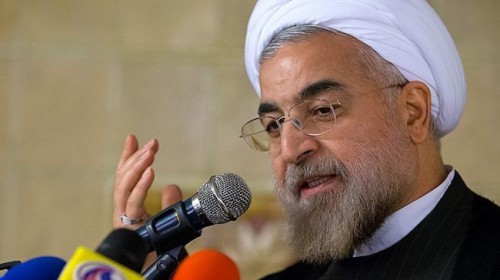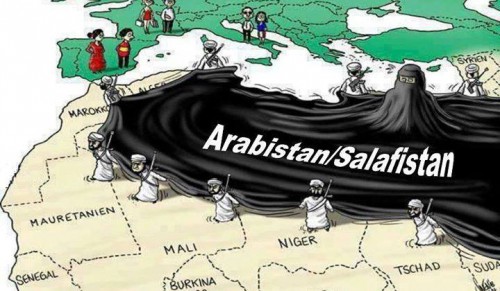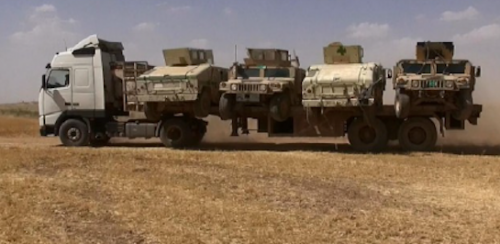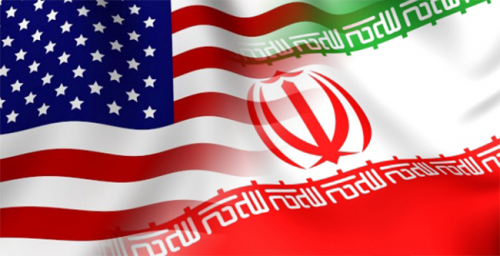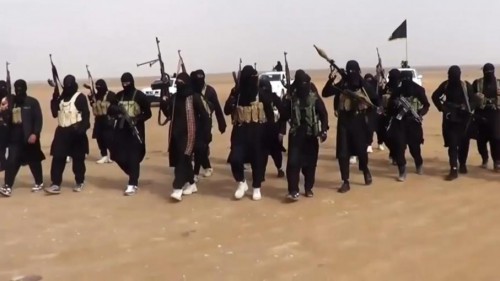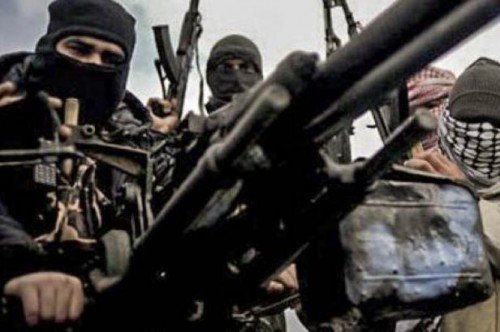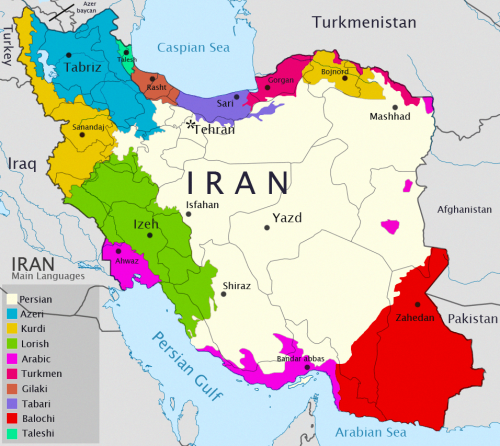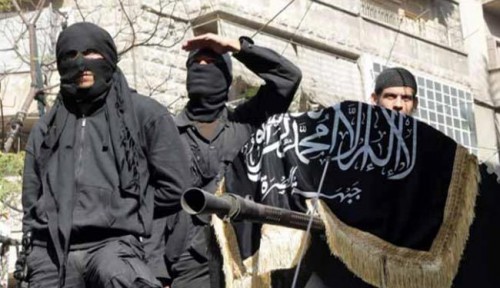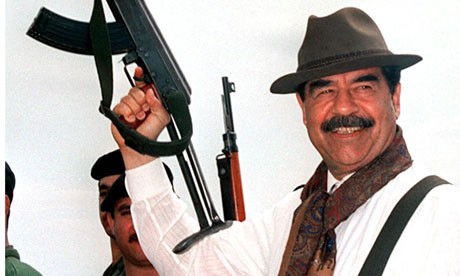Le Moyen-Orient, chacun le sent bien, est la zone géographique d’où la prochaine guerre mondiale pourrait éclater.
L’actualité dans cette région nous a montré une avancée étonnamment rapide des forces armées de l’ « Emirat islamique de l’Irak et du Levant » (EIIL en français). L’événement rappelle un peu la rapidité soudaine et « inexpliquée » de l’avance des troupes croato-musulmanes en Bosnie, dans les années 1990 face aux Serbes, jusqu’à des lignes que l’on a su peu après avoir été négociées pour laisser la moitié du pays à chaque belligérant.
L’on sait les Américains très attentifs au Sud-Ouest asiatique, région comprenant Israël et le golfe Persique. Afin d’y maintenir et d’y développer leur influence, ils y ont envisagé, ce n’est pas nouveau, la vieille idée romaine du « divide ut regnes » (diviser pour régner). De nouvelles frontières ont été planifiées par les services de Washington pour fractionner ce grand Moyen-Orient. Dans cette optique, deux cartes ont été portées à la connaissance du public. Ces deux cartes partent de la même logique : faire éclater les Etats musulmans les plus puissants de la région en des unités plus petites, utilisant pour cela les clivages religieux, ethniques, tribaux, etc. :
– La première a été publiée en juin 2006 dans la revue The Armed Forces Journal, sous la signature du lieutenant-colonel « à la retraite » Ralph Peters. Elle montre la zone comprise entre la Méditerranée et le Pakistan.
– La deuxième (image en Une) a été publiée dans le New York Times du 28 septembre 2013 par la géopoliticienne Robin Wright, travaillant pour le « United States Institute of Peace », organisme dont l’intitulé à lui seul fleure bon la manipulation des foules. La zone à fractionner s’étend ici de la Libye au golfe Persique.
Les deux cartes se recoupent, comme par hasard, sur la partie la plus stratégiquement sensible de la région : celle comprenant le « Croissant fertile » et la péninsule Arabique. La logique, on l’a vu, est la même : diviser les Etats musulmans (et eux seuls) en utilisant les fractures les plus… utilisables. Tout porte à croire que les différences entre les deux scénarios sont des actualisations, des corrections, tenant compte des faits dont les véritables auteurs ont pris conscience au fur et à mesure de la mise en place de cette stratégie.
Tout avait « bien » commencé par l’occupation de l’Irak en mars 2003 (on se doute bien que la carte publiée en 2006 avait été conçue bien avant cette date). La haine entre sunnites et chiites, consciencieusement entretenue par le gouvernement chiite majoritaire accaparant largement plus que sa part au profit de sa communauté, a achevé la cassure de l’Irak ; cassure en trois, sunnites et chiites étant trop occupés à s’entretuer pour ne pas laisser les Kurdes devenir indépendants de fait.
Par contre, le plan buta ensuite sur la résistance inattendue du régime syrien. Il a donc fallu lui concéder (voir la deuxième carte), en plus du réduit alaouite prévu, toute la tranche occidentale du pays, dont Damas ; peu importe. En Syrie comme en Irak, gouvernementaux et antigouvernementaux laissent aujourd’hui les Kurdes se gouverner comme ils le souhaitent.
Cependant, et l’on rejoint ici l’actualité, il est apparu possible et souhaitable pour les services américains d’unir les sunnites des deux Etats arabes fractionnés en un seul bloc, le « Sunnistan », tant pour renforcer ces deux groupes rebelles à leur gouvernement central que pour transcender les frontières et donc mieux les effacer. Nous en sommes donc à la phase où les services américains (et israéliens) favorisent la constitution au plus vite de ce « Sunnistan » regroupant les Arabes sunnites du nord de la zone. Ils aident donc par tous les moyens l’armée de l’émirat islamique (la flamme du religieux est aujourd’hui plus dynamisante que celle de l’ethnie) de l’Irak et du Levant.
Les prochaines étapes sont très probablement inscrites dans les cartes publiées, et plus exactement dans la deuxième, celle de Robin Wright. Pour les Kurdes, il conviendra d’unir les Etats de fait du nord de la Syrie et du nord de l’Irak en une nation unique, mais discrètement, progressivement, de crainte de provoquer une réaction de la Turquie voisine, ultra-sensible sur la question. « On » cherchera aussi à re-diviser en deux le Yémen, que l’on avait un peu oublié, selon la partition historique créée par l’occupation britannique du Sud.
L’Arabie Saoudite, quant à elle, a été prévue éclatée en cinq blocs, tant dans la première que dans la deuxième carte. Mais plus les mêmes. A l’origine (carte de 2006), le royaume des Saoud était délesté :
- du nord-ouest donné à la Jordanie (après acceptation du roi Abdallah II de recueillir des Palestiniens de Cisjordanie ?) ;
- plus grave : de la province côtière du Hassa, ô combien importante, puisqu’elle recèle la quasi-totalité des ressources pétrolières connues du royaume, afin de constituer un Etat arabe chiite avec le sud de l’Irak et le sud-ouest de l’Iran arabophone ;
- plus dramatique encore sous l’aspect du prestige, d’un « Vatican islamique », contenant notamment les deux villes saintes pour l’islam de La Mecque et de Médine, et confié à une présidence tournante des différents groupes musulmans : dont les chiites détestés (arabes ou pire encore iraniens), les Indonésiens mangeurs de porc, les faux Arabes du Maghreb, ou encore les Noirs descendants d’esclaves ;
- pour faire bonne mesure, d’une portion du sud-ouest pour agrandir le Yémen
Pour ce royaume, il semble que les donneurs d’ordres aient compris que les Saoudiens, même lorsqu’ils sont opposés à la caste princière qui régit le royaume, se sentiraient humiliés d’être agrégés à des Etats voisins qu’ils regardent de haut : la Jordanie que les Saoud ont repoussée, l’Irak brisé par la guerre, le Yémen arriéré économiquement. La nouvelle carte maintient l’objectif de la partition de l’Arabie Saoudite en cinq entités, mais, cette fois, il transparaît clairement que la logique tribale a été privilégiée. Il est même prévu de priver Ryad de son dernier débouché sur la mer.
Reste à réaliser ce plan. Aux dernières nouvelles, le clan familial des princes saoudiens, puissant, très soudé (condition essentielle de survie dans la région) et bien conscient de ce qu’on lui prépare, n’a pas du tout l’intention de se laisser faire…
François Montgisard
Docteur en droit
Auteur de Ces Français qui gouvernèrent le monde
NDLR :
Pour la première carte, lire aussi un article de Mahdi Darius Nazemroaya
Israël en Libye : Préparer l’Afrique au « choc des civilisations »
http://www.silviacattori.net/spip.php?article2266
Cet article, qui date de 2011, donne surtout un certain éclairage sur la guerre menée par l’OTAN contre la Libye et sur les intentions réelles des Etats-Unis dans la perspective d’une dominance entière.
Pour la deuxième carte, se reporter à un article publié le 25/10/2013 par Jeune Afrique qui préfigure ce que serait le nouveau Moyen-Orient fragmenté sous le coup de dynamiques multiples, le tout sous l’œil dominateur des USA.
http://www.jeuneafrique.com/Article/JA2753p060.xml0/
Se reporter aux deux articles avec les liens ci-dessus pour avoir une meilleure lisibilité des deux cartes.
Source : Polémia.






 del.icio.us
del.icio.us
 Digg
Digg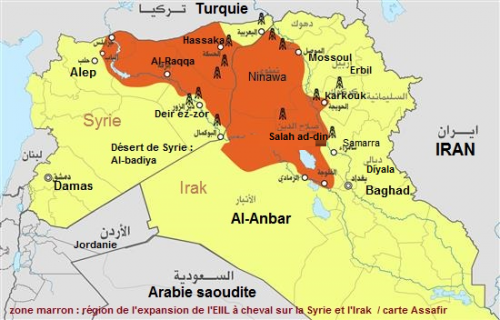

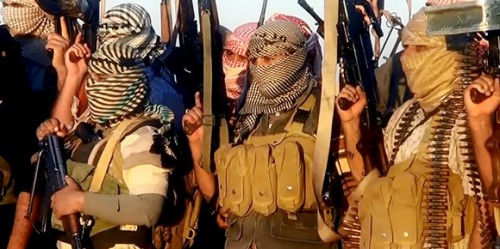
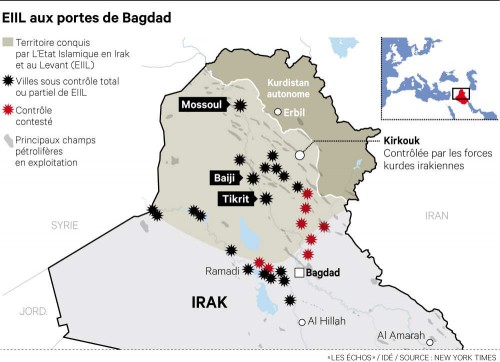

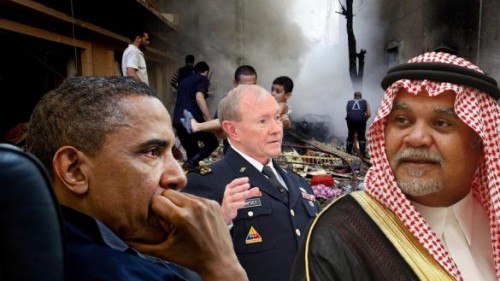
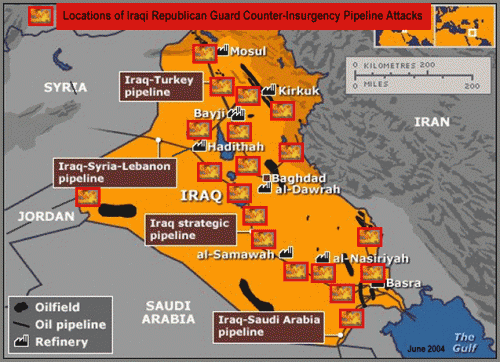
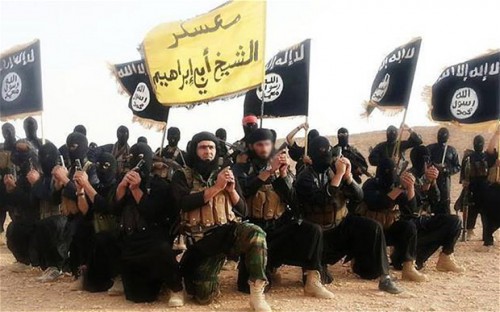
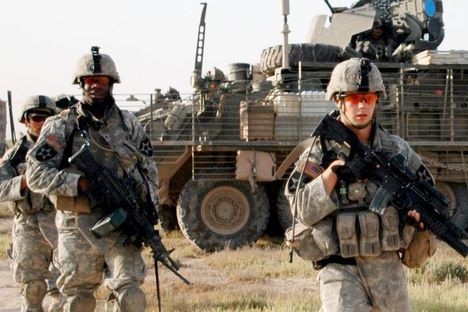

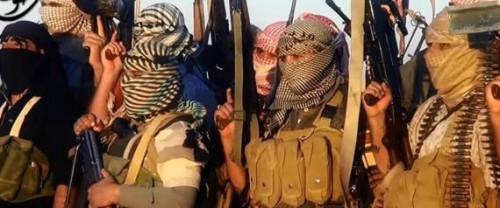


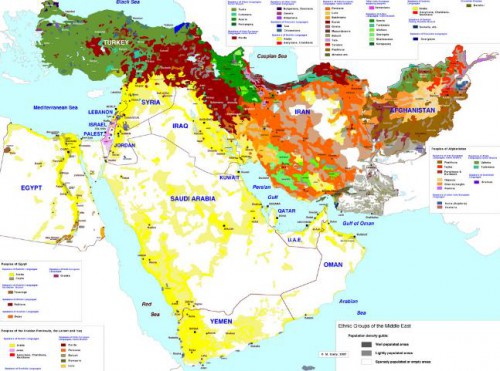
 Pour en revenir à l’Irak, la dissociation entre trois entités sunnite, chiite et kurde satisferait certains acteurs, mais en inquièterait beaucoup d’autres. Elle a été défendue par le président de l’Irak, le Kurde Jalal Talabani,( aujourd’hui en retrait pour des raisons de santé ), mais n’était pas plus recevable autrefois qu’elle ne le serait aujourd’hui par les autres partenaires. Par sa constitution, l’Irak est déjà un Etat unique, souverain, indépendant et fédéral ( Art. 1 ) ; les Kurdes y trouvent de nombreux avantages, ce qui explique leur soutien au gouvernement actuel. Ni la Turquie, ni l’Iran ne sont très favorables à la notion de « Kurdistan » ( la majorité du peuple kurde vit dans ces deux pays ) ; quant aux pays arabes du Golfe, ils ne veulent à aucun prix d’une extension du chiisme iranien sur la Mésopotamie. En résumé, le désordre, créé par l’intervention américaine n’est pas prêt de disparaître. Pour être juste, la politique revancharde envers les Sunnites du premier ministre chiite Nouri al-Maliki n’a pas amélioré les choses, au point que ce dernier est peut-être devenu un obstacle à tout règlement négocié. Oui, le monde devient bien dangereux, et on comprend qu’il est plus aisé de maintenir que de rompre l’intangibilité des frontières… Quelle que soit l’option choisie, le risque de mourir, pour rien ou non, sera présent ; autant que ce soit contre des barbares...
Pour en revenir à l’Irak, la dissociation entre trois entités sunnite, chiite et kurde satisferait certains acteurs, mais en inquièterait beaucoup d’autres. Elle a été défendue par le président de l’Irak, le Kurde Jalal Talabani,( aujourd’hui en retrait pour des raisons de santé ), mais n’était pas plus recevable autrefois qu’elle ne le serait aujourd’hui par les autres partenaires. Par sa constitution, l’Irak est déjà un Etat unique, souverain, indépendant et fédéral ( Art. 1 ) ; les Kurdes y trouvent de nombreux avantages, ce qui explique leur soutien au gouvernement actuel. Ni la Turquie, ni l’Iran ne sont très favorables à la notion de « Kurdistan » ( la majorité du peuple kurde vit dans ces deux pays ) ; quant aux pays arabes du Golfe, ils ne veulent à aucun prix d’une extension du chiisme iranien sur la Mésopotamie. En résumé, le désordre, créé par l’intervention américaine n’est pas prêt de disparaître. Pour être juste, la politique revancharde envers les Sunnites du premier ministre chiite Nouri al-Maliki n’a pas amélioré les choses, au point que ce dernier est peut-être devenu un obstacle à tout règlement négocié. Oui, le monde devient bien dangereux, et on comprend qu’il est plus aisé de maintenir que de rompre l’intangibilité des frontières… Quelle que soit l’option choisie, le risque de mourir, pour rien ou non, sera présent ; autant que ce soit contre des barbares... 
